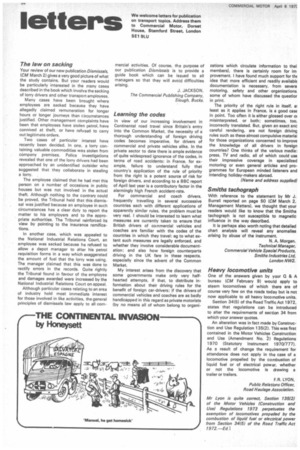The law on sacking
Page 56

If you've noticed an error in this article please click here to report it so we can fix it.
Your review of our new publication Dismissals, (CM March 2) gives a very good picture of what the study contains. But your readers would be particularly interested in the many cases described in the book which involve the sacking of lorry drivers and other transport employees.
Many cases have been brought where employees are sacked because they have allegedly claimed remuneration for longer hours or longer journeys than circumstances justified. Other management complaints have been that employees have stolen petrol, have connived at theft, or have refused to carry out legitimate orders.
Two cases of particular interest have recently been decided. In one, a lorry containing valuable commodities was stolen from company premises. Police investigations revealed that one of the lorry drivers had been approached by an unidentified outsider who suggested that they collaborate in stealing a lorry.
The employee claimed that he had met this person on a number of occasions in public houses but was not involved in the actual theft. Although nothing to the contrary could be proved, the Tribunal held that this dismissal was justified because an employee in such circumstances has a clear duty to report the matter to his employers and to the appropriate authorities. The Tribunal reinforced its view by pointing to the insurance ramifications.
In another case, which was appealed to the National Industrial Relations Court, an employee was sacked because he refused to allow a depot manager to alter his petrol requisition forms in a way which exaggerated the amount of fuel that the lorry was using. The manager claimed that this was done to rectify errors in the records. Quite rightly the Tribunal found in favour of the employee and damages awarded were increased by the National Industrial Relations Court on appeal.
Although particular cases relating to an area of industry hold most immediate interest for those involved in like activities, the general principles of dismissals law apply to all corn
mercial activities. Of course, the purpose of our publication Dismissals is to provide a guide book which can be issued to all managers so that they will avoid difficulties arising.
J. JACKSON, The Commercial Publishing Company, Slough, Bucks.












































































































